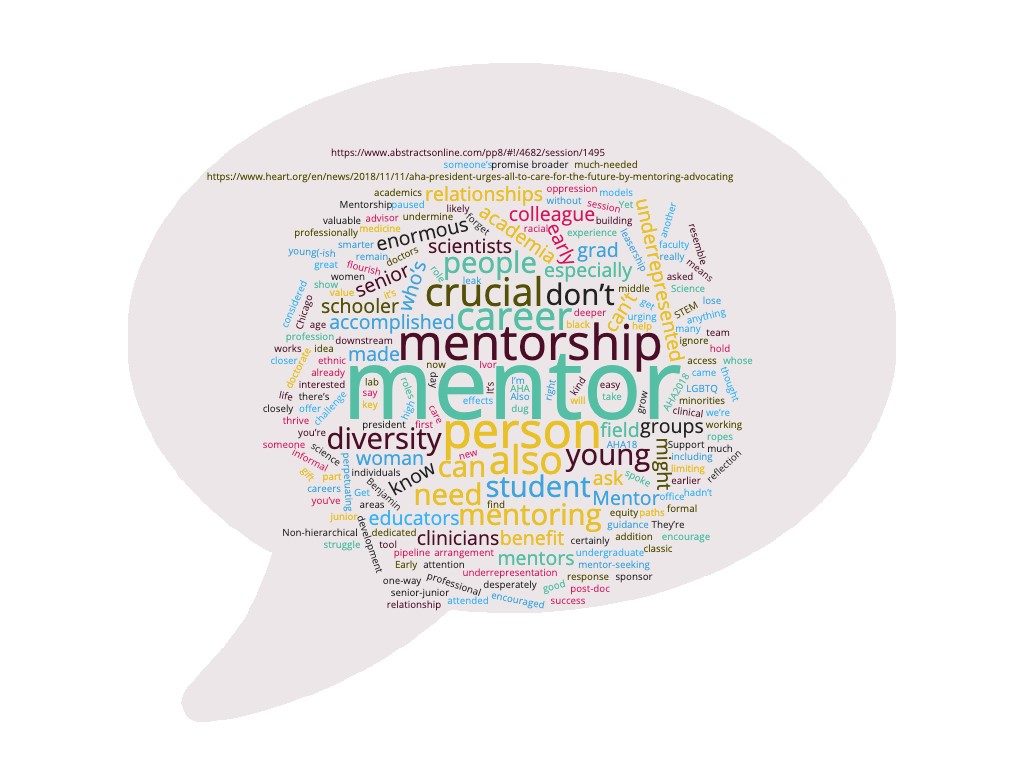 Early in our careers, academics are encouraged to find good mentors. You need an advisor to get a doctorate, and this person is a mentor. You might be working in someone’s lab as a grad student or post-doc, and that person can be a mentor. You might be junior faculty and have a senior mentor to show you the ropes. There are formal mentorship relationships and informal mentoring relationships, and you’ve likely had both in your career. They’re a key part of professional development.
Early in our careers, academics are encouraged to find good mentors. You need an advisor to get a doctorate, and this person is a mentor. You might be working in someone’s lab as a grad student or post-doc, and that person can be a mentor. You might be junior faculty and have a senior mentor to show you the ropes. There are formal mentorship relationships and informal mentoring relationships, and you’ve likely had both in your career. They’re a key part of professional development.
But what about being a mentor? The other day, a colleague came into my office and asked me to mentor her. My first response was to say “no, I can’t, I’m really new, we’re the same age, I don’t know anything you don’t know, you’re smarter than me. . .” But I paused. What made her ask for a mentor? What made her ask me? What can I offer this person to help her thrive professionally, so we don’t lose a much needed person in the field?
On reflection, I considered what mentorship means. Having a senior, accomplished mentor is a gift, especially if that person also works as a sponsor for you. Yet it’s also valuable to have a mentor who’s closer to where you are— someone whose life and struggle more closely resemble yours. A young(-ish) woman in academia can mentor another young woman in academia. Non-hierarchical and team models of mentorship also hold enormous promise. I attended a great session on this at #AHA18 in Chicago — I hadn’t thought of that before. Mentorship as a tool to encourage success is much broader than the classic senior-junior one-way relationship. My mentor-seeking colleague and I could certainly benefit from this kind of arrangement.
It’s also easy to forget that as early career scientists, clinicians, and educators, we are already accomplished. A grad student, an undergraduate student, a high schooler, or a middle schooler who’s interested in your field could benefit from your guidance and experience right now. Also at #AHA2018, AHA president Dr. Ivor Benjamin spoke about mentoring young black doctors. He then dug deeper, urging us to mentor young people earlier, before there’s a leak in the pipeline. This is such a crucial idea— the value of mentoring people from underrepresented groups in your profession is enormous. Science and medicine desperately need diversity, but this diversity cannot grow and flourish without the attention of dedicated mentors. Support is especially crucial for racial and ethnic minorities, LGBTQ people, and women, who remain underrepresented in many areas of STEM, including crucial leadership roles. In addition to perpetuating oppression by limiting access to career paths for individuals and groups, the downstream effects of this underrepresentation undermine equity in our science and clinical care. We can’t ignore the need for diversity and the crucial role for mentorship in building it.
So, early career scientists, educators, and clinicians, will you take up the challenge of mentorship?
Need a resource or want some further reading?
Check out this discussion of The Mentorship Guide.